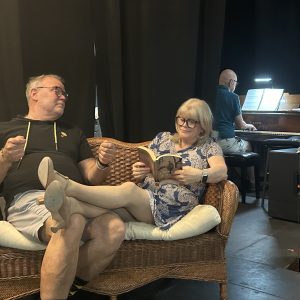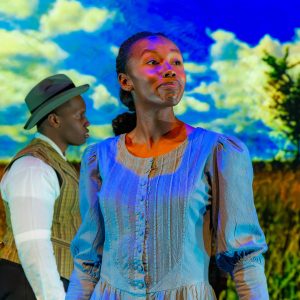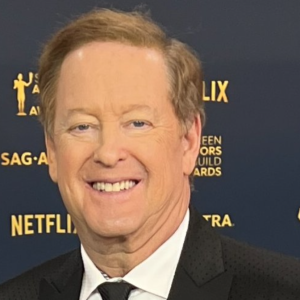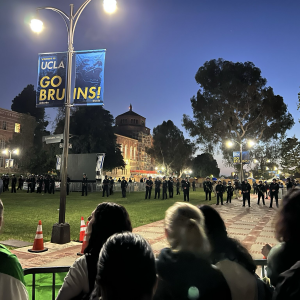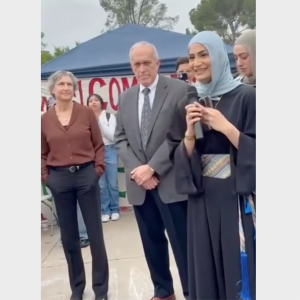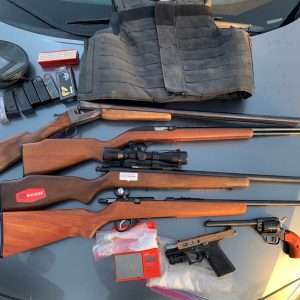 View Winners →
View Winners → Pasadena Playhouse Presents ‘It’s a Wonderful Life’ Radio Play
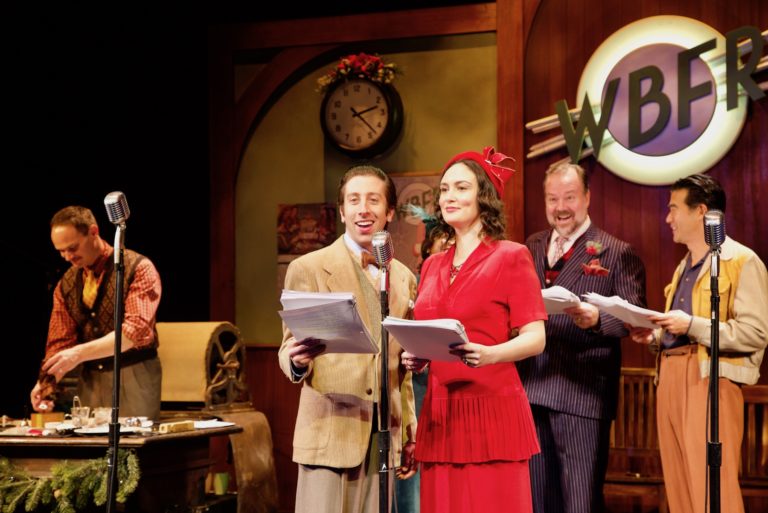

Shown left to right: Jeff Gardner, Simon Helberg, Rebecca Mozo, Rob Nagle, and Ryun Yu in ‘It’s a Wonderful Life: A Live Radio Play’. – Photo by Brick Patrick
By May S. Ruiz
There are some movies that so embody the spirit of Christmas that we want to watch them every year. One of those films is Frank Capra’s ‘It’s a Wonderful Life,’ which is now considered one of the best motion pictures ever made.
‘It’s a Wonderful Life: A Live Radio Play,’ will be part of the largest holiday celebration in the history of the Pasadena Playhouse. On stage from December 12 through December 23, it was adapted by Joe Landry from the celebrated 1946 film.
Simon Helberg, whom most of us know as Howard Wolowitz in the CBS award-winning smash hit ‘Big Bang Theory,’ stars as the despondent George Bailey who’s contemplating suicide. His guardian angel intervenes and shows him what his town would have been like had he never been born.
Actor, director, and producer Cameron Watson, who directed last year’s Pasadena Playhouse radio play ‘Miracle on 34th Street’ will once again be at the helm. He distinguishes each production, “Last year’s show, which is an iconic holiday story, is a lighter piece viewed from a child’s perspective and we used some animated backdrops, like the Christmas cards, to underscore that.
“On the other hand, ‘It’s a Wonderful Life’ is a pretty dark tale which starts with George Bailey ready to jump off the bridge. The roles are meatier and the characters are more complex in this piece. While we’re treating it as a traditional play, we’re doing something unexpected but will be supported by the story.”
“Joe Landry took all the materials from the script and put them into this radio play format,” Watson explains. “It’s faithful to the movie in a very clever way. One really fun thing about doing a radio play is seeing actors’ versatility. There are only five performers in this play that has about 45 parts. Two actors will be playing the roles of George Bailey and Mary, George’s wife. The three others portray close to 20 characters each, from the cab driver to the various children. And they’re going to do that with merely their voice, there’s no costume change.
“It’s such a treat for audiences to see what went on behind the scenes of a radio play in the old days. They can visually paint the story for themselves; they get to imagine what this cab, for instance, looks like; they can envision the bridge that George Bailey is standing on. I love that it makes for a very open canvas.
“We did ‘Miracle on 34th Street’ last year as the original radio play, which was a Lux Radio Theatre, and it was remarkable. It had the same commercial breaks that were in the radio play from the 1940s. This one will have some built-in commercial breaks as well except that Joe crafted it so that there’s a little more structure to it.”
“The other good thing about a radio play format is that it’s a short production,” continues Watson. “It’s not a lengthy commitment for actors because it doesn’t require extensive preparation – they don’t have to memorize lines, they’re reading the script. We’ll rehearse it in one week and then the show starts. That short commitment gives us more opportunities to find the best talents. It’s such a privilege for a director to be working with the finest people in the industry.”
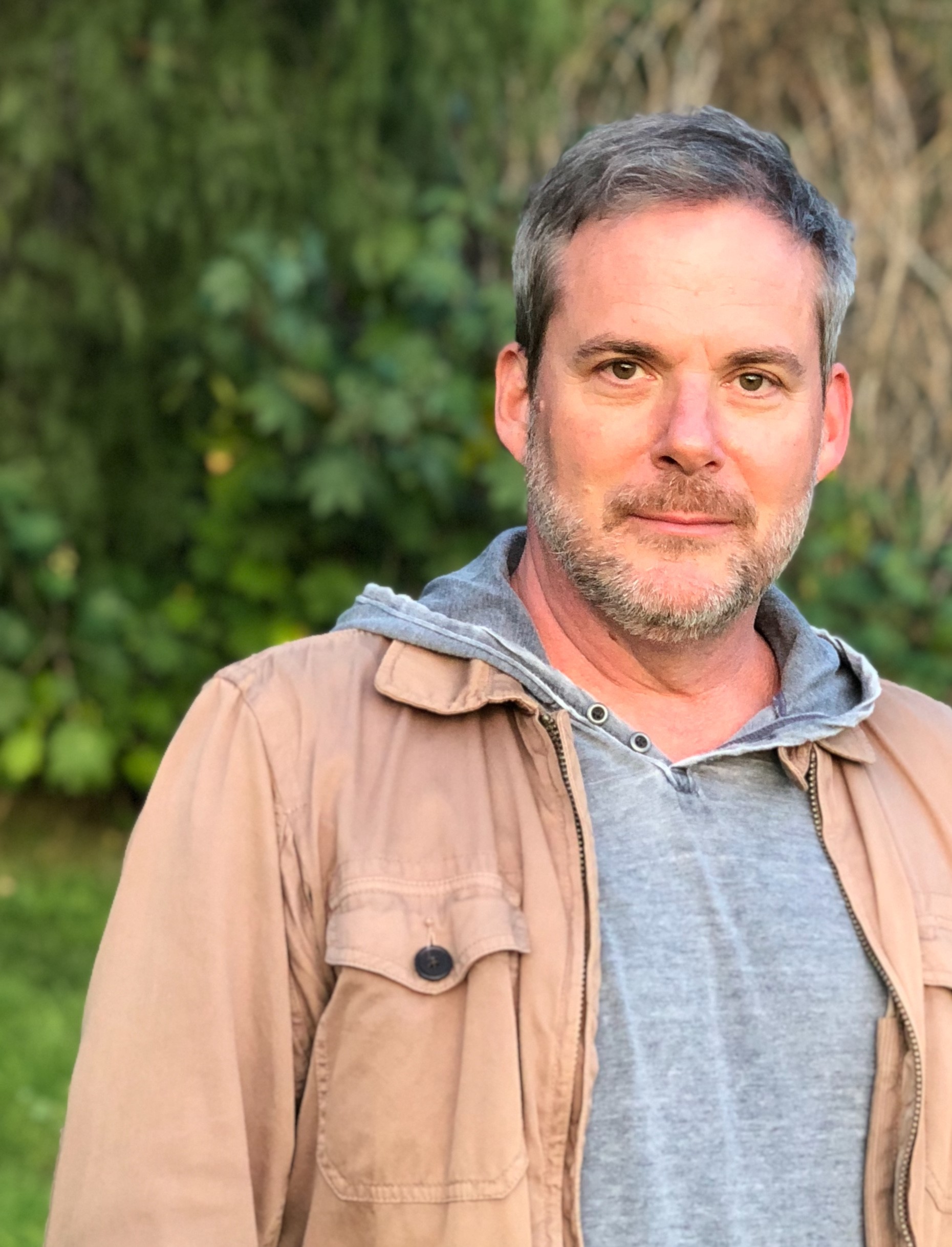
Cameron Watson. – Courtesy photo / Pasadena Playhouse
Asked whether this scheme makes his job easier or harder, Watson replies, “I can’t say if it’s easier or harder to direct; I think there’s a purity to the process because it’s all about the text and the words. Our mission is to make the words come alive. In a sense my task as a director is more important than if I were directing a traditional play.
“My focus is to make sure the actors really mine all the emotion in the role so that when they play the 15 or so characters, the audience knows exactly who it is. Each actor has to use a voice specific to a character so the audience isn’t confused, and that requires a different skill set. So I think I have a technical job that I wouldn’t have to do if it were a full production.”
As a Christmas offering, ‘It’s a Wonderful Life’ doesn’t appear to be geared for children. Watson recalls, “I remember watching the movie as a young boy and being scared when George was ready to jump off the bridge. That was scary for children to see because the sense of mortality isn’t something they are aware of yet.”
However, Watson quickly assures, “While it might look dark at first glance, when we get to the part of the story that’s somber, there will be a surprise that I think children will be enchanted by.”
Watson adds, “I was reading it again last night as I prepared for rehearsals and, not unlike last year’s radio play, it’s all about believing in Santa, or in hope, or in whatever we hang our beliefs on. Furthermore, it has a message of self-worth, of how much we matter – to our family, to our friends, to each other. That, in a small way, we are connected to people and we are important … that kindness is important. And I think that’s why the story has withstood the test of time. I get very moved by it; the play is very emotional to me.
“I emphasized to the actors that we have to tell this story from our hearts. Even if it’s a radio play, there will be plenty of sounds that will help the audience envisage what’s going on, for them to have a good time, and to enjoy the play. The actors have to treat it as the most important thing in the world, like it’s the first time the story is being told and that it’s truthful. Because it’s a radio play, there’s a tendency for it to be taken lightly, and actors have to really work hard to impart the message at its core.”
“Oftentimes, we go through life without being aware that a small, kind gesture – a warm hug, a friendly touch, a ‘hello’ to someone we see on the street – is important. ‘It’s a Wonderful Life’ is a story that reminds us that all of us, not matter how insignificant we think we are, have a contribution to make to society,” Watson wisely pronounces.
In our increasingly rancorous and deeply divided society, the lesson of George Bailey’s life takes on a greater significance. It makes us recognize that while, individually, our existence might not seem important enough to make a difference in the world, just as it takes millions of stars to light a dark sky, the good things we do in our little sphere of influence could very well make a world of difference.



















